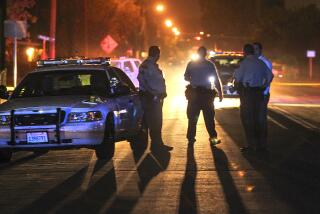Editorial: Tehama shooting is deadly evidence that California needs to reform its bail system
The gunman who went on a deadly shooting rampage in Tehama County on Monday apparently had been out on bail after being charged with stabbing a neighbor — an aspect of the grisly crime that underscores a huge but little discussed problem with money bail systems like California’s.
The argument for bail reform is generally couched in terms of justice for people accused of nonviolent crimes who are kept locked up before trial because they don’t have enough money to post bail. The risk that they will flee or commit new crimes might be infinitesimal, but under our bail system, that doesn’t matter. No money, no release.
Alleged killer Kevin Neal’s rampage may illustrate a stronger point: Just having bail money, or being able to raise it, shouldn’t be enough to secure the release of a person who is suspected of a violent crime, has a reputation of being somewhat unhinged and has a house full of weapons.
There’s not yet enough information on the deadly incident and the circumstances of Neal’s release to say with certainty whether the judge acted properly in setting bail, reportedly at $300,000. Courts in most California counties abide by “schedules” that pair criminal charges with bail amounts and may take into consideration whether the accused has previous convictions. The judge can reject the scheduled amount but may have felt bound by it, or the prosecutor may have failed to argue that the charge against Neal increased his risk. Or there could be other circumstances that have yet to come out. It’s important to note that apart from bail, the court issued protective orders that barred Neal from having guns.
The folly of the money bail system, though, is the notion that high bail amounts somehow protect against the release of a suspect who’s a danger to the community. It has become common for bail in murder cases to be set at $1 million or more in the belief that the dangerous suspect won’t be able to pay it, and so won’t be able to get out. That’s a clever work-around, but it’s also profoundly dishonest. Suspects who are too risky to be released simply shouldn’t be released, no matter how much money they have in the bank, how rich their friends are, or how much a bail bond agent is willing to put up. In Neal’s case, apparently he had the money and was set free.
A bail-reform bill pending in the state Legislature would do what several other states have done: replace the money-based system with one based on pretrial assessments of the risk that suspects pose to the community. Not surprisingly, the bail industry and prosecutors are lobbying lawmakers heavily to reject the measure. Legislators should keep in mind the 15 people – five dead, 10 wounded – who may well be victims of the current system, which set a man free because of the size of his wallet.
Follow the Opinion section on Twitter @latimesopinion and Facebook
More to Read
A cure for the common opinion
Get thought-provoking perspectives with our weekly newsletter.
You may occasionally receive promotional content from the Los Angeles Times.






